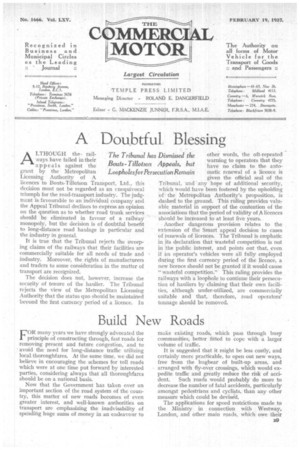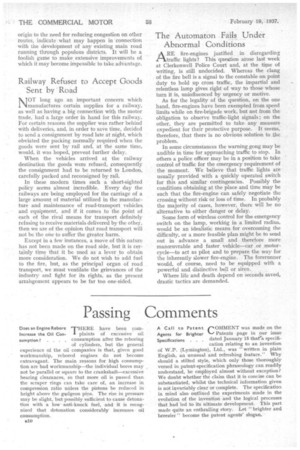Build New Roads F OR many years we have strongly advocated
Page 27

Page 28

If you've noticed an error in this article please click here to report it so we can fix it.
the principle of constructing through, fast roads for removing present and future congestion, and to avoid the need for long-distance traffic utilizing local thoroughfares. At the same time, we did not believe in encouraging the schemes for toll roads which were at one time put forward by interested parties, considering always that all thoroughfares should be on a national basis.
Now that the Government has taken over an important section of the road system of the country, this matter of new roads becomes of even greater interest, and well-known authorities on transport are emphasizing the inadvisability of spendiiig huge sums of money in an endeavour to make existing roads, which pass through busy communities, better fitted to cope with a larger volume of traffic.
It is suggested that it might be less costly, and certainly more practicable, to open out new ways, free from the bugbear of built-up areas, and arranged with fly-over crossings, which would expedite traffic and greatly reduce the risk of accident. Such roads would probably do more to decrease the number of fatal accidents, particularly amongst pedestrians and cyclists, than any other measure which could be devisdd.
The applications for speed restrictions made to the Ministry in connection with Westway, London, and other main roads, which owe their origin to the need for reducing congestion on other routes, indicate what may happen in connection with the development of any existing Main road running through populous districts. It will be a foolish game to make. extensive improvements of which it may become impossible to take advantage.
Railway Refuses to Accept Goods Sent by 'Road
NOT long ago an important concern which manufactures certain supplies for a railway, as well as having a big connection with the motor trade, had a large order in hand for this railway. For certain reasons the supplier was rather behind with deliveries, and, in order to save time, decided to send a consignment by road late at night, which obviated the packing normally required when the goods were sent by rail and, at the same time, would, it was hoped, prevent further delay.
When the vehicles arrived at the railway destination the goods were refused, consequently the consignment had to be returned to London, carefully packed and reconsigned by rail.
In these modern times such a short-sighted policy seems almost incredible. Every day the railways are being employed for the carriage of a large amount of material utilized in the manufacture and maintenance of road-transport vehicles and equipment, and if it comes to the point of each of the rival means for transport definitely refusing to receive materials delivered by the other, then we are of the opinion that road transport will not be the one to suffer the greater harm.
Except in a few instances, a move of this nature has not been made on the road side, but it is certainly time that it be used as a lever to obtain more consideration. We do not wish to add fuel to the fire, but, as the principal organ of road transport, we must ventilate the grievances of the industry and fight for its rights, as the present arrabgement appears to be far too one-sided.
The Automaton Fails Under Abnormal Conditions
/RE fire-engines justified in disregarding ..traffic lights? This question arose last week at Clerkenwell Police Court and, at the time of writing, is still undecided. Whereas the clang of the fire bell is a signal to the constable on point duty to hold up cross traffic, the impartial and relentless lamp gives right of way to those whose turn it is, uninfluenced by urgency or motive.
As for the legality of the question, on the one hand, fire-engines have been exempted from speed limits while on fire-brigade work, but not from the obligation to observe traffic-light signals ; on the other, they are permitted to take any measure expedient for their protective purpose. It seems, therefore, that there is no obvious solution to the problem.
In some circumstances the warning gong may be audible in time for approaching traffic to stop. In others a police officer may be in a position to take control of traffic for the emergency requirement of the moment. We believe that traffic lights are usually provided with a quickly operated switch for this and similar contingencies. Possibly the conditions obtaining at the place and time may be such that the fire-engine can safely negotiate the crossing without risk or loss of time. In probably the majority of cases, however, there will be no alternative to either danger or delay.
Some form of wireless control for the emergency switch on the lamp, working in a limited radius, would be an idealistic means for overcoming the difficulty, or a more feasible plan might be to send out in advance a small and therefore more manceuvrable and faster vehicle—car or motorcycle—to act as pilot and to prepare the way for the inherently slower fire-engine. The forerunner would, of course, need to be equipped with a powerful and distinctive bell or siren.
Where life and death depend on seconds saved, drastic tactics are demanded.




















































































